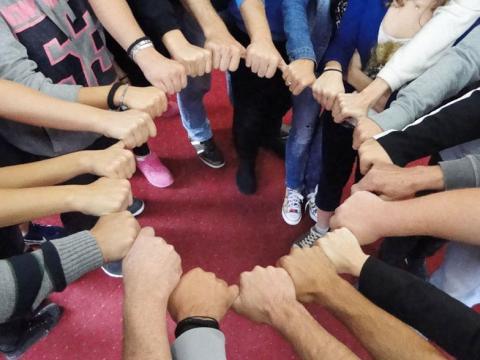_2.jpg)
An interethnic group of actors trained by NDI in conflict transformation shares war stories from audience members at a Playback Theater performance in Prizren, Kosovo. Credit: Arta Qorri
A young Kosovar Serbian actress sinks to her knees and, stricken with grief, expresses her longing for an uncle who is still “missing” 16 years after Kosovo’s ethnic conflict ended in 1999. The Kosovar Albanian man sitting to her left on stage watches mesmerized. It is his story that the actress is telling, and though he is unable to understand her words, spoken in Serbian, he tells the audience after the performance that she has captured the essence of his grief and pain. Through theater, the actors are retelling the history of violence between ethnic Albanians and Serbs in Kosovo in a new way that encourages empathy and healing. At the end of the evening, which is full of audience stories re-enacted, another audience member stands up and asks the interethnic theater group in front of her, “Where have you been for the last 16 years?”
The importance of art in conflict transformation was evident last month, when a group of Kosovar students from ethnic Albanian and Serbian backgrounds came together to participate in a Playback Theater workshop in the city of Prizren, near the southern border of Kosovo.
For the students, it was their first introduction to Playback Theater, a form of improvisational theater in which actors spontaneously “play back” real stories from an audience, transforming reality through acting and converting feelings into a play.
Playback Theater promotes the right for any voice to be heard, bringing group concerns to the surface, and stimulates a dialogue by making different perspectives visible.
“How does it feel to be ‘the other,’ holding someone else’s experience?” asks the trainer, after students enact a personal story told by one participant. According to the trainer, Armand Volkas, a psychotherapist and drama therapist who founded The Center for the Living Arts in Oakland, California, the goal of such exercises is to develop empathy, create a culture of empathy and understand the forces that create one’s identity. “Feelings are never wrong,” Volkas says, continuing his training session by asking the participants: “Is everyone in the empathic place?”
Sixteen years after NATO intervened in Kosovo to halt violent interethnic conflict, ethnic Albanian and Serbians live and work in communities separated geographically, linguistically, administratively and psychologically. However, the start of European Union-mediated dialogue in 2013 between Kosovo and Serbia to normalize relations has opened new opportunities for constructive interethnic engagement, especially in northern Kosovo, as Kosovar Serb communities there progressively come under Kosovo administration.
NDI is implementing a Conflict Transformation Program, with support from USAID, to expand the opportunities for citizens to engage in constructive interethnic dialogue and cooperate in pursuit of common interests, and to develop sustainable interethnic relationships and joint activities that contribute to mutual gain.
Maja, a participant of NDI’s program, does not hesitate to join interethnic groups. Although she is occasionally the only Kosovar Serb in other groups she attends and some friends have discouraged her from taking part, Maja has always been encouraged by her family to accept other cultures and she continues to participate. “I am sharing the hotel room with Fatbardha [a Kosovar Albanian participant], neither of us understands each other’s language, but we get along just fine,” she said.
Referring to the training in Playback Theater, Maja added, “I could never empathize with someone in this way I am doing it now, now I feel I can tell them everything.”
“Art is a better form than economic or political relations to help communities connect. The prejudices that I had before getting to know the students from the Serb community are no longer a part of me,” said Edon, an ethnic Albanian student of the Academy of Arts in Pristina.
At the end of the workshop, the theater students gave an open performance in the city of Prizren, interacting with a wider audience using Playback Theatre to stage their stories from the country's violent past. The audience was surprised and inspired to see ethnic Albanians, Serbs and others jointly telling the stories of one another in a way not tried before in Kosovo.
This group of theater students is just one of five groups participating in NDI’s Conflict Transformation Program in Kosovo. Other groups include a group of community activists, a group of emerging leaders, an interfaith leaders group and a group of media representatives. Each group is exploring ways to find common ground and engage in activities across ethnic divisions in ways that are beneficial for the larger community. Theater groups are an example of how creativity can be used to broach sensitive topics and encourage empathy for a more peaceful future.


_1_1%EF%B9%96itok=-mRy-k7T.jpg)

_1_1%EF%B9%96itok=Jqo24HhO.jpg)